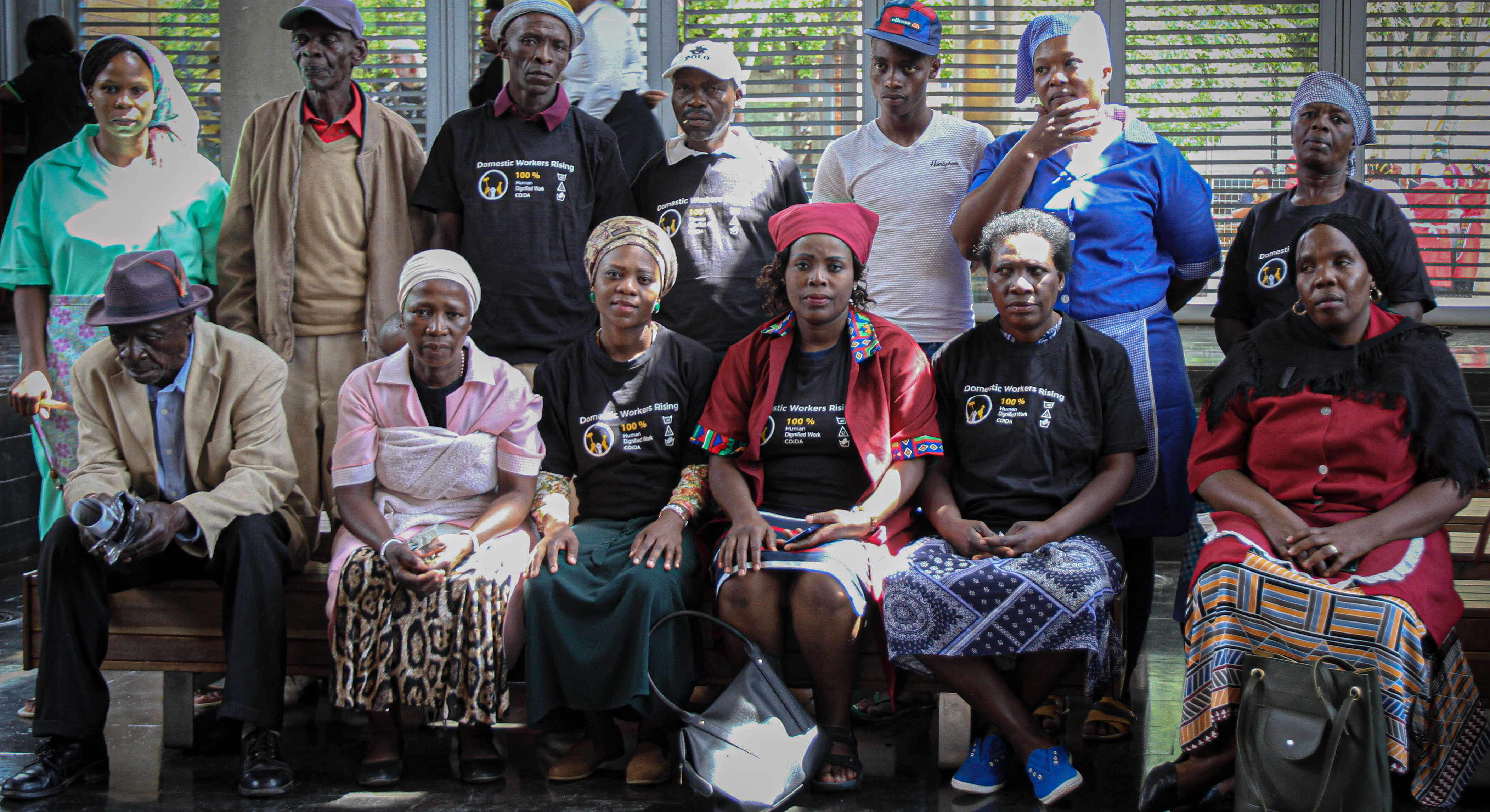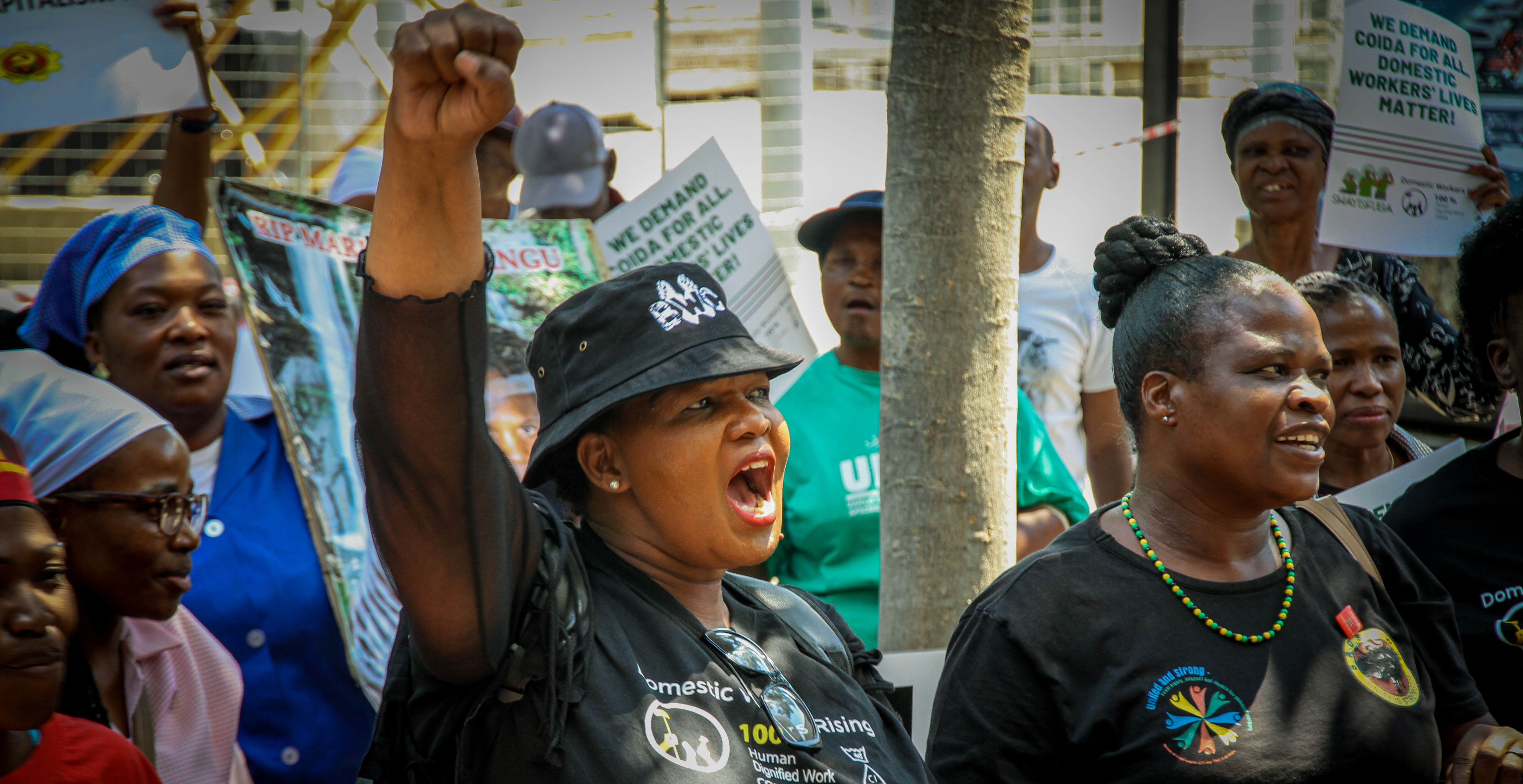On 10 March, 2020, Sylvia Mahlangu travelled with a dozen of her family members from Mpumalanga to the Constitutional Court. The four-hour journey paled in comparison to the eight-year one that landed her case at the highest court in the land. This follows a 2019 judgment by the North Gauteng High Court which ruled that the Compensation of Occupational Injuries and Diseases Act (COIDA) is unconstitutional in its exclusion of domestic workers. For Mahlangu and those who have accompanied her through the legal journey, this exclusion has had a severe impact.
Domestic worker Maria Mahlangu worked for the De Clercq family for 22 years before she died by drowning in the family’s swimming pool while cleaning windows. According to reports, Mahlangu was discovered floating lifelessly by her employer hours later. When the deceased’s daughter and only child, Sylvia, sought compensation from the Department of Labour, she was informed that she was not eligible for funds from the national compensation commission as domestic workers are not recognised as employees under COIDA.
“My mother was the breadwinner. At home, we knew that month end she would arrive and she was the one who financially supported all of us,” says Sylvia.
“I knew that [every month end] she would phone me to meet up with her and we would go home together. We would only see her once a month. So it hurt a lot to lose her.”
Maria, who died on 31 March, 2012, was not part of a workers’ union. She, like many others in her line of work, was isolated from her peers. Her life revolved around the family she served for two decades at the cost of her own family life.
Sylvia says that on the day of her mother’s passing the former employers swore to stand by her for the rest of her life.
“They said ‘from today onwards, you are our child’. That was in 2012 – which was the last year I ever spoke to them.”
Not long after their promises, Sylvia had to contend with the realisation that she would not be compensated by her mother’s employers, nor would they keep any of their promises.
 Sylvia Mahlangu (third from bottom left) and family at the Constitutional Court on Tuesday, 10 March 2020. Photo by Sumeya Gasa
Sylvia Mahlangu (third from bottom left) and family at the Constitutional Court on Tuesday, 10 March 2020. Photo by Sumeya Gasa
Sylvia and her family had to scrape together the little they had to lay Maria Mahlangu at her final resting place. And while Sylvia has not received the closure she sought from her mother’s employers, she says the High Court victories have counted for something. The support she received from women in unions and advocacy groups has given her hope that some day she will be compensated for her loss.
“Today, I am very happy that we have made it to the Constitutional Court. I can see that we are close to the finish line. I am happy that we have come this far today,” she says.
“The compensation is not going to bring her back to life but it will at least be some consolation because it will close some of the gaps.”
Regional Gender Lead for Southern Africa at Oxfam South Africa, Rukia Cornelius, says domestic workers are denied their constitutional right to equality by legislations and policies such as COIDA and the National Minimum Wage Act.
“The rights of domestic workers are most precarious. They work for someone in a household so it’s really hard to get to them,” says Cornelius.
Cornelius explained that at the heart of the matter is an intersection of gender, race and economic inequality which undervalues the contribution domestic workers make to the economy.
“For example, the National Minimum Wage Act doesn’t consider the conditions that domestic workers work under,” says Cornelius.
The Act values domestic labour at R15 an hour whereas general labourers are entitled to R20 an hour.
“The employer gets to decide what kind of access the worker has. You’re very, very vulnerable (as a domestic worker). And the law and the policies [...] don’t consider the conditions that domestic workers work under.”
But a group of women who lived the experience of being domestic workers and all that it came with were fighting for the rights of those like Maria and Sylvia Mahlangu. When Pinky Mashiane co-founder of the South African Domestic Service and Allied Workers Union (SADSAWU) found an article about Maria Mahlangu’s death she sought out Sylvia and soon began the long and bitter battle to obtain justice for the Mahlangu family.
The domestic worker’s union, with the assistance of the Socio-Economic Rights Institute, Oxfam South Africa, United Domestic Workers of South Africa, Domestic Workers Alliance and Solidary Centre, obtained a significant victory when the North Gauteng High Court declared COIDA unconstitutional as it essentially denied the rights of domestic workers.
The Department of Labour and the Compensation Commissioner, respondents in the matter, conceded to the judgment handed down by the High Court. And, during the Constitutional Court hearing, lawyers for the department confirmed that the department is willing to pay domestic workers and families like that of the late Maria Mahlangu.
“The state will pay those claims which are legitimate, submitted and successful,” said Advocate Hamilton Maenetje.
Not only did the high court find COIDA unconstitutional in the case of Maria Mahlangu but also prescribed that the ruling stands for future and retrospective cases. This prompted a concern about establishing the legitimacy of retrospective cases.
“How do you avoid fraudulent claims?” Justice Chris Jafta posed to the applicants’ lawyers.
The applicants argued that the onus would be on the claimant to present proof that an injury or death is as a result of the employee’s work activities.
Questioning the Department’s willingness to compensate a potentially large number of future and retrospect claimants, another concern raised by the Constitutional Court was that of the solvency of the compensation fund.
“We asked the actuaries, in the event of floodgates, are we going to be insolvent?” said the State’s lawyers who also confirmed that their analysis found it unlikely that claims from domestic workers would overwhelm the compensation fund to the point of insolvency.
Other potential logistical matters of the proposed claims process include raising awareness about the rights to which domestic workers are, according to the high court ruling, entitled.
“The majority of the applicants work in private dwellings. And yes, in this matter, they are represented by a union […]. I just wonder how most of them will be in a position to know that they can make claims and how to then make claims,” enquired Justice Zukisa Tshiqi.
The lawyers for the applicants suggested that the outcome of the case would be communicated to their constituencies and affected parties using various forms of media. Meanwhile, the department’s lawyers added that the claims process, as it currently stands, is facilitated through Labour’s online platform. This presents a challenge for workers who do not have access to internet services or the know how to navigate an online system – all of which the advocates admitted would require more investigation.
The COIDA Amendment Bill has been finalised and is due to be presented to Parliament. While the optimistic Mahlangu family prepared to make the journey back to Mpumalanga, the court reserved judgment on their case. DM




 Sylvia Mahlangu (third from bottom left) and family at the Constitutional Court on Tuesday, 10 March 2020. Photo by Sumeya Gasa
Sylvia Mahlangu (third from bottom left) and family at the Constitutional Court on Tuesday, 10 March 2020. Photo by Sumeya Gasa